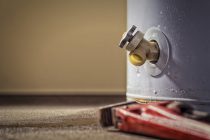If your home has a forced-air system (HVAC), it’s important to understand how it works—especially during the coronavirus (COVID-19) outbreak. Knowing the basics can help you take steps to get cleaner, more efficiently circulated air in your home, while keeping allergens and other unwanted particles at bay.
HVAC Tips For Your Home
This guidance comes from the U.S. Centers for Disease Control and Prevention (CDC), the U.S. Environmental Protection Agency (EPA) and the American Society of Heating, Refrigerating and Air-Conditioning Engineers (ASHRAE).1
What is a forced-air system?
HVAC stands for heating, ventilation and air conditioning. The HVAC system in your home is designed to help you control the temperature, humidity, circulation rate and indoor air quality. Your HVAC system will either provide air conditioning only, or a combination of air conditioning and heating. Both types have a fan that pulls heated or cooled air through a filter and distributes temperature and humidity-controlled air through the vents. Depending on the type of HVAC air filter you select, it may be able to capture millions of invisible particles like dust, pet dander, pollen, exhaust, tobacco smoke, viruses and bacteria from the air passing through the filter.
What can I do to keep my HVAC system running properly?
HVAC systems are designed to heat and cool your home to comfortable temperatures, and they operate best in these temperatures, too. The air in the room with your HVAC should stay between 68 and 78 degrees with 40 to 60% humidity.¹ You should replace the air filter often and use high-efficiency Filtrete™ HVAC filters with a MERV rating of 12 or higher (MPR 1500 or higher for Filtrete™ HVAC Air Filters).¹ The cleaner your filter, the better it catches small unwanted airborne particles, so make sure you’re replacing it on the schedule recommended on the filter’s packaging. For more accurate guidance on when to change your filter, our Filtrete™ Smart Filter and compatible Filtrete™ Smart App allow you to track filter life in real-time and receive filter change notifications based on usage. The app also works with other Filtrete™ air filters—simply scan your filter’s barcode to start a personalized timer.
Also, HVAC systems do the best job cleaning your air when they’re used consistently, so keep the system running on a low fan setting at all times.



